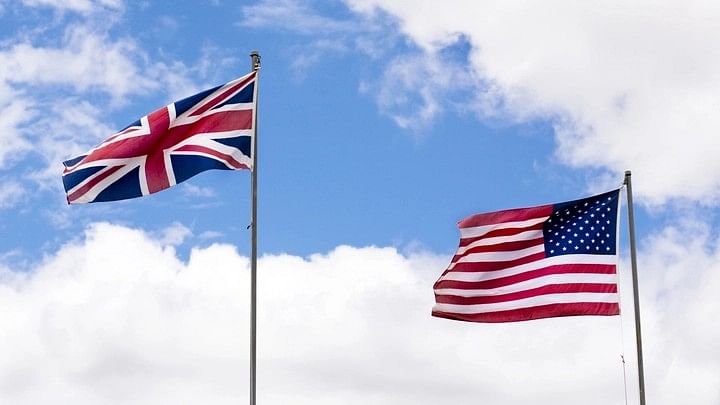
UK and US flags
Credit: iStock Photo
New Delhi: London and Washington DC have thrown their weight behind Ottawa, which had to withdraw two-thirds of its diplomats from India amid deteriorating bilateral relations over the killing of a Khalistani Sikh terrorist in Canada.
President Joe Biden’s administration in Washington DC expressed concern after Ottawa adhered to a deadline set by New Delhi and withdrew 41 of its diplomats from India.
The US State Department issued a statement in Washington DC, asking New Delhi to uphold its obligations under the 1961 Vienna Convention on Diplomatic Relations.
Prime Minister Rishi Sunak’s government in London was more forthright, clearly stating that the United Kingdom did not agree with India’s decision which had led to the departure of the diplomats of Canada from India. The UK too stressed that India’s action was not consistent with the principles of the Vienna Convention.
India already rejected Canada’s allegation that its move to ensure parity in the diplomatic presence of the two nations in each other’s capital was “a violation of international norms”.
London and Washington DC also reiterated calls to New Delhi to cooperate in the probe launched by Ottawa into the allegation of India’s role in the killing of Khalistani Sikh terrorist Hardeep Singh Nijjar in the British Columbia province of Canada.
Ottawa withdrew 41 of Canada’s 62 diplomats from India on Wednesday and Thursday, complying with New Delhi’s deadline that would have expired Friday. New Delhi had conveyed to Ottawa that it would withdraw the immunity and privileges of all but 21 diplomats of Canada in India after October 10. The deadline for Canada to withdraw the rest of its diplomats from India had later been extended by 10 days to October 20.
“We are concerned by the departure of Canadian diplomats from India, in response to the Indian government’s demand of Canada to significantly reduce its diplomatic presence in India,” Matthew Miller, a spokesperson of the US State Department, stated in Washington DC. “Resolving differences requires diplomats on the ground. We have urged the Indian government not to insist upon a reduction in Canada’s diplomatic presence and to cooperate in the ongoing Canadian investigation.”
The US also asked India to uphold its obligations under the 1961 Vienna Convention on Diplomatic Relations, including with respect to privileges and immunities enjoyed by accredited members of Canada’s diplomatic mission.
“We expect all states to uphold their obligations under the 1961 Vienna Convention on Diplomatic Relations. The unilateral removal of the privileges and immunities that provide for the safety and security of diplomats is not consistent with the principles or the effective functioning of the Vienna Convention,” the Foreign, Commonwealth and Development Office of the UK government said in a statement, adding: “We continue to encourage India to engage with Canada on its independent investigation into the death of Hardeep Singh Nijjar”.
Both London and Washington DC echoed Ottawa to stress that Canada needed diplomats “on the ground” in India to “resolve differences” between the two nations.
The relations between the two nations hit a new low in the past few weeks over Ottawa’s allegation about India’s involvement in the killing of Nijjar, the commander of Khalistan Tiger Force, in the parking lot of a gurdwara in Canada on June 18. Both sides expelled each other’s diplomats and issued tit-for-tat travel advisories. India called Canada a safe haven for terrorists and suspended issuing visas for Canadians.
New Delhi also asked Ottawa to downsize its high commission in the national capital of India.
The move, according to New Delhi, was initiated in view of Canada’s interference in the internal affairs of India and was intended to bring parity between the number of India’s diplomats in Canada and that of Canada’s in India.
India already rejected Canada’s allegation that its move to ensure parity in the diplomatic presence of the two nations in each other’s capital was “a violation of international norms”.
New Delhi argued that its action was based on Article 11.1 of the Vienna Convention, which provided that in the absence of specific agreement as to the size of the mission, the receiving state might require that the size of a mission be kept within limits considered by it to be reasonable and normal, having regard to circumstances and conditions in the receiving state and to the needs of the particular mission. Besides, it added, Canada's domestic legislation itself provided for comparable treatment of foreign diplomats in the North American country to what its own diplomats get in a foreign country, as well as withdrawal of any of their diplomatic privileges and immunities.
Though New Delhi made Ottawa withdraw most of its diplomats from India, Prime Minister Justin Trudeau’s government stated that it would not take any reciprocal action on India’s diplomats in Canada. It also vowed to continue investigating India’s role in the killing of the Khalistani Sikh terrorist in Canada.
